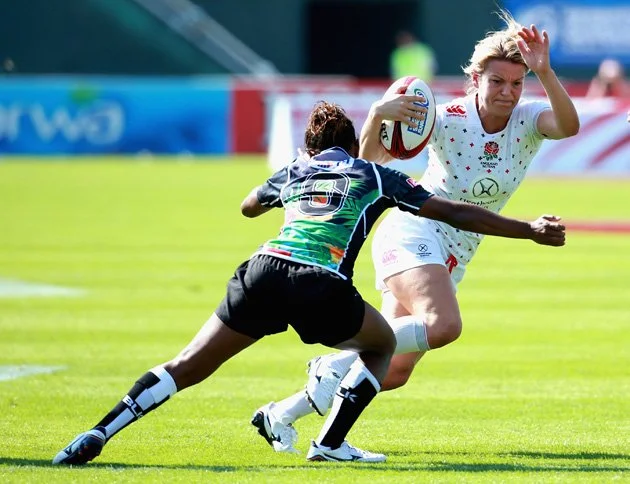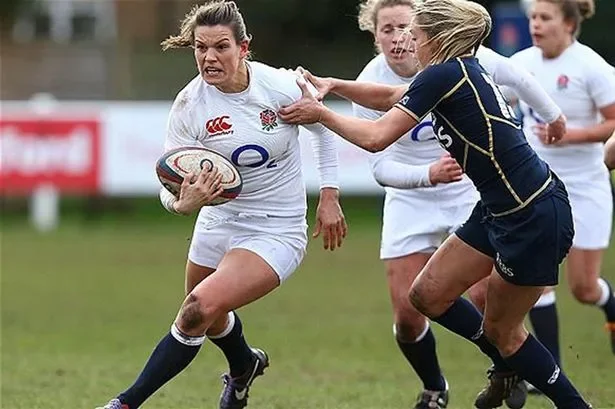Coaching With Curiosity and Care: Creating Neuroinclusive Environments
Introduction
In celebration of Neurodiversity Week 2023, we wanted to spotlight a coach who exemplifies what it means to be truly inclusive—without necessarily setting out to be. Abi Chamberlain, former Women’s Rugby 7s Captain and current London Irish Women’s Coach, didn’t come into coaching with a checklist of neuroinclusive actions. She came in with a philosophy built on care, curiosity, and connection. And the result? A coaching approach that feels natural, authentic, and enabling.
We’ve already shared the perspective of one of her athletes, Hannah Owen, who described what it meant to be coached by someone who really sees and understands her. Now, we’re turning the camera toward Abi herself, to explore the values and mindset that shape her approach—and why they matter more than ever in a sporting landscape that is beginning to embrace difference.
“I Care and I’m Curious”: Abi’s Coaching Philosophy
“I don’t do this stuff to be a neuroinclusive coach. I do it because I chose to coach. And coaching, for me, is about enhancing athlete performance.”
Abi is the first to say she’s not perfect. She admits to getting things wrong, to having bad days, and to still learning. But what underpins everything she does is curiosity and care. Not just for the sport, but for the people who show up to play it.
“I want to understand them. I want to know how to unlock performance. That’s what I love.”
That curiosity means looking beyond the drill, beyond the game plan, and into the lives and minds of the individuals who make up her team.
Coaching the Individual Inside the Team
“Coaching a team is about coaching a group of individuals so they can work well together.”
Abi rejects the idea that there’s one way to be an athlete, or one way to be coached. She’s worked hard to create a psychologically safe environment—one where athletes feel comfortable disclosing their needs, their energy levels, their learning styles, and even their struggles.
From simple check-ins during warm-ups to informal chats over post-training meals, Abi finds ways to connect on a human level.
“It’s not about whether they’ve had a good or bad session. It’s about whether they’ve had a good or bad day.”
A Safe Space Isn’t a Soft Space
“I get told I look scary all the time! I’m quiet, I can be abrupt, and I’ve got a bit of a ‘bad face’ apparently.”
Despite her self-deprecating humour, Abi has created an environment where players are unafraid to be honest—even about things that are often hidden, like neurodivergence or mental health. Why?
“Because there’s no consequence for thinking differently. There’s no consequence for not having the emotional capacity to deal with something on a certain day. Why should there be?”
It’s a powerful message in a world where athletes often fear being seen as ‘difficult,’ ‘fragile,’ or ‘disruptive’ for being different. Abi’s philosophy flips that on its head: differences are not threats—they’re entry points to understanding and performance.
Meeting the Moment—Not Just the Metric
“I recognise if someone’s stepped back from a group. I notice when they’re not getting it. I explain things differently—not because I’m ticking a box, but because that’s what good coaching is.”
Abi doesn’t deliver training in one way. She adjusts. She visualises. She draws analogies from everyday life. And she values those brief moments of walking between drills or stretching after a session as golden opportunities to ask a simple but impactful question: “Did that land?”
“If someone didn’t understand, I’ll walk with them to the cones and explain it again. That takes no time. But it makes all the difference.”
Letting Athletes Think for Themselves
“If your coaching is so strict that athletes just follow orders, what happens when something unexpected happens in a game?”
Abi believes strongly in autonomy. That if athletes don’t feel they can question, adapt, or reflect, then they lose their ability to think for themselves.
Elite sport is full of uncertainty. And preparing athletes to cope with that means empowering them to make decisions—not just follow instructions.
“You’re not building robots. Emotion is what drives performance. Suppressing that doesn’t make someone better—it limits them.”
Inclusion Is Not a Community-Level Luxury
“Inclusive coaching is seen as the realm of grassroots sport. But when you get to the elite end, suddenly it’s all about structure and control. That’s the mistake.”
Abi is clear: high performance and inclusion are not opposites. They are partners.
“When you’re talking about hundredths of a second, or inches in a try-line decision—why wouldn’t you try to think differently?”
It’s a bold but essential point. If elite sport only values one kind of thinking, one kind of behaviour, and one kind of body—it will miss out. On innovation. On talent. On what makes a team adaptable under pressure.
“Open the Doors. Remove the Barriers.”
“What’s the job of the coach? To make it as easy as possible for the athlete to perform. That’s it.”
Abi boils it down with clarity. And in doing so, she makes a case for why her philosophy works—not just for neurodivergent athletes, but for everyone.
“Happy athletes who are cared for will perform better. That’s just basic human need.”
Whether it’s explaining a drill differently, asking how someone’s day was, or checking in after training, Abi’s philosophy is simple but profound: open doors. Remove barriers. Enable excellence.
Final Thoughts
Abi Chamberlain didn’t set out to be a ‘neuroinclusive coach.’ But in many ways, that’s what makes her such a powerful example. Her coaching is inclusive because it is human. Because it’s built on care, on curiosity, and on the belief that enabling individuals is the foundation of building great teams.
And whether you’re a coach, a teammate, or an athlete yourself, there’s something in her story to take with you into your next session.
“Everyone’s got something. It’s not about putting people in boxes. It’s about opening them up.” – Abi Chamberlain
Follow
Key Takeaways for Neurodivergent Individuals
You don’t need to justify your needs
→ The right coach will work with you—not around you.
Curiosity and care matter
→ If your coach listens, values, and adjusts—you’re in the right place.
Discomfort is not a failing
→ Feeling overwhelmed or needing a different pace doesn’t make you less.
Key Takeaways for Peers, Supporters, and Parents
Support doesn’t always mean answers
→ Sometimes it’s about just noticing, just being aware.
Psychological safety benefits everyone
→ When one person speaks up, others feel braver too.
Celebrate difference
→ Your teammate’s unique way of learning might unlock something for the whole team.
Key Takeaways for Coaches, Leaders, and Organisations
Curiosity is a performance tool
→ The more you understand your athletes, the better you coach.
Inclusive coaching is not a side project
→ It’s central to enabling performance—especially at elite level.
Don’t build robots
→ Build thinkers. Feelers. Adaptable, resilient people who thrive under pressure.
Originally recorded as a video interview, this blog post was written by Caragh McMurtry. Subheadings were added by the Neurodiverse Sport team to support readability.


